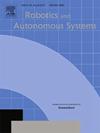Learning-aided state estimation for robotic rollators with experimental validation
IF 5.2
2区 计算机科学
Q1 AUTOMATION & CONTROL SYSTEMS
引用次数: 0
Abstract
While demand for assistive technology has risen with aging populations and concomitant increase in mobility disabilities, conventional (passive) walker designs have demonstrated safety and usability limitations. Robotic rollators (or 4-wheeled walkers) have been proposed to address concerns, including slip, fall, and collision risks. To develop control systems for robotic rollators, accurate estimation of the states is required. While model-based estimation approaches have been widely investigated for mobile robots, robotic rollators present unique challenges due to model parameter changes and uncertainties. In contrast, data-driven estimation approaches require sufficient excitation modes during learning to address corner cases. The proposed learning-aided state estimation (L-ASE) method augments an unscented transformation observer with a long short term memory (LSTM) based learning algorithm to estimate rollator states by using on-board inertial measurement unit data and wheel speeds. The stability and boundedness of the error covariance is investigated. The developed learning-aided estimation method is also experimentally verified for the walker-assisted gait and demonstrates superior performance using a robotic rollator platform in rigorous testing conditions.
机器人滚轴的学习辅助状态估计与实验验证
虽然对辅助技术的需求随着人口老龄化和行动障碍的增加而增加,但传统的(被动)助行器设计已经证明了安全性和可用性的局限性。机器人滚轮(或4轮行走器)已被提议解决问题,包括滑倒,跌倒和碰撞风险。为了开发机器人辊子的控制系统,需要对其状态进行准确的估计。虽然基于模型的估计方法已被广泛研究用于移动机器人,但由于模型参数的变化和不确定性,机器人辊子提出了独特的挑战。相比之下,数据驱动的估计方法在学习过程中需要足够的激励模式来解决极端情况。提出的学习辅助状态估计(L-ASE)方法利用车载惯性测量单元数据和车轮速度,将无气味变换观测器与基于长短期记忆(LSTM)的学习算法相结合,对滚轮状态进行估计。研究了误差协方差的稳定性和有界性。所开发的学习辅助估计方法也在学步器辅助步态的实验中得到验证,并在严格的测试条件下使用机器人滚轴平台显示出优越的性能。
本文章由计算机程序翻译,如有差异,请以英文原文为准。
求助全文
约1分钟内获得全文
求助全文
来源期刊

Robotics and Autonomous Systems
工程技术-机器人学
CiteScore
9.00
自引率
7.00%
发文量
164
审稿时长
4.5 months
期刊介绍:
Robotics and Autonomous Systems will carry articles describing fundamental developments in the field of robotics, with special emphasis on autonomous systems. An important goal of this journal is to extend the state of the art in both symbolic and sensory based robot control and learning in the context of autonomous systems.
Robotics and Autonomous Systems will carry articles on the theoretical, computational and experimental aspects of autonomous systems, or modules of such systems.
 求助内容:
求助内容: 应助结果提醒方式:
应助结果提醒方式:


